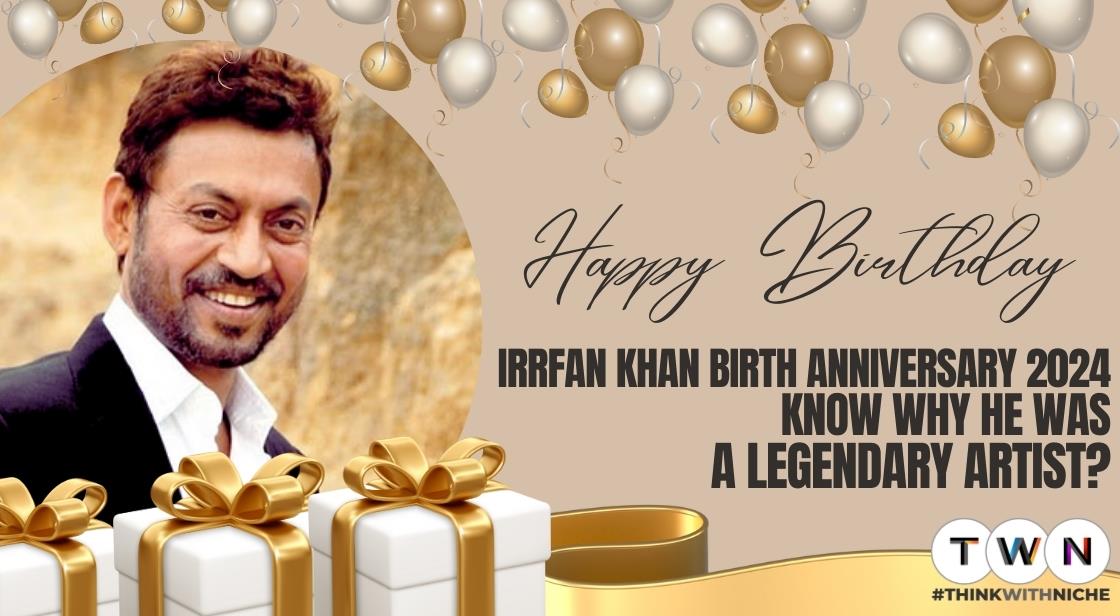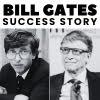Irrfan Khan Birth Anniversary 2024: Know why he was a Legendary Artist

Blog Post
Beyond stardom, Irrfan Khan remains an enigma; an actor who carved his legacy not through glitz and glamour, but through the sheer depth and versatility of his craft.
Today, on his birth anniversary, we celebrate this unique artist and explore the facets that made him one of a kind.
Irrfan Khan, revered as one of India's finest actors, left an indelible mark on both Indian and international cinema. His brilliance on screen wasn't merely confined to performances; it echoed a philosophy that defied conventional heroism.
For him, the essence of being a true idol extended far beyond the glitz and glamour often associated with actors.
In an interview with Times of India, he candidly remarked on the superficiality of actors being hailed as heroes or icons, emphasizing a deeper societal contribution beyond mere entertainment.
Despite his untimely departure, Irrfan's legacy resonates through his cinematic oeuvre, his ethos, and the distinctiveness that defined both his career and personal life.
Few actors have captivated audiences like Irrfan Khan. He wasn't a conventional Bollywood hero, yet he commanded the screen with a quiet intensity and an unparalleled range.
From Shakespearean soliloquies to small-town anxieties, Khan effortlessly embodied diverse characters, leaving an indelible mark on Indian cinema and beyond.
Let's unravel the layers of this extraordinary artist, a man who led by example and whose life embodied a uniqueness that set him apart from his contemporaries.
Irrfan Khan was not just an actor, he was an artist who portrayed emotions on the cinema screen.
His dedication, immense art and humility inspire us even today.
"Today, on his 57th birth anniversary January 7 2024, we salute his life and his unmatched art. Irrfan Khan, you were truly unique."
Exploring the Unforgettable Journey of Irrfan Khan on His Birth Anniversary
Unveiling the Roots: A Look at Irrfan Khan's Early Life
While the world remembers Irrfan Khan for his captivating performances and impactful presence on screen, understanding his early life offers a glimpse into the foundation that shaped this exceptional actor. Let's delve into the formative years that nurtured the legend:
1. Humble Beginnings:
-
Born Sahabzade Irfan Ali Khan in 1967 in Tonk, Rajasthan, India, his journey began in a family with Pathan ancestry. His father ran a tire business, and his mother held the family together.
-
Despite not coming from a traditional film background, Khan displayed a natural inclination towards the arts from a young age. He participated in school plays and even joined a local theatre group in Jaipur.
2. A Cricketing Dream on Hold:
-
As a teenager, Khan was a talented cricketer, even being selected for the CK Nayudu Trophy, a stepping stone to first-class cricket. However, due to financial constraints, he wasn't able to participate, leading him to focus on his passion for acting.
3. Irrfan Khan's Education and Early Forays into Theatre:
-
Khan completed his Master's degree in Jaipur before enrolling in the prestigious National School of Drama (NSD) in Delhi, where he honed his craft under renowned gurus like B.V. Karanth.
-
After NSD, he began his professional career on stage, performing in acclaimed plays like "Macbeth" and "Hamlet." Khan's dedication and talent earned him recognition within the theatre community.
4. Transition to Television and the Big Screen:
-
The late 1980s and early 1990s saw Khan venturing into television, appearing in serials like "Sara Jahan Hamara" and "Chandrakanta." While these roles provided exposure, they didn't fully satisfy his artistic aspirations.
-
His film debut came in 1988 with a minor role in Mira Nair's "Salaam Bombay!," though he continued to find his footing in television until the mid-1990s.
5. Shaping his Path:
-
The turning point arrived in 1998 with Asif Kapadia's "The Warrior," where Khan's intense and nuanced portrayal of Aslam Khan marked him as an actor of exceptional talent.
-
Subsequent projects like "Maqbool" and "Haasil" further solidified his reputation, showcasing his ability to portray complex characters with depth and sensitivity.
Why He Was One of a Kind:
1. Irrfan Khan The Unconventional Hero:
Beyond the Bollywood Mold: Irrfan Khan, the Hero of Vulnerability and Reality
In a cinematic landscape obsessed with larger-than-life heroes, Irrfan Khan dared to be different. He dismantled the Bollywood archetype of the chiseled, invincible protagonist, replacing it with flawed, relatable characters wrestling with inner demons and everyday struggles. This wasn't mere rebellion; it was a conscious choice to hold a mirror to society, to explore the complexities of human existence beneath the glitz and glamor.
1. Embracing Vulnerabilities:
A stark contrast to the song-and-dance Bollywood hero, Khan dived headfirst into characters scarred by vulnerabilities. In "Maqbool," Shakespeare's Macbeth finds a hauntingly real translation in his portrayal of a guilt-ridden gangster clinging to power. His eyes, brimming with regret and desperation, spoke volumes without a single melodramatic line. Similarly, in "Paan Singh Tomar," he embodies the conflicted athlete torn between societal expectations and personal desires, showcasing the vulnerability of a man grappling with age and fading glory.
2. Redefining Masculinity:
Khan shattered the stereotypical Bollywood alpha male persona. He wasn't afraid to portray characters grappling with insecurity, fear, and even impotence. Films like "The Lunchbox" and "Piku" depict tender male vulnerability with grace and humor, challenging traditional notions of masculinity. His nuanced portrayal of a lonely widower in "The Lunchbox" or the quirky yet patient caregiver in "Piku" demonstrated that strength lies not just in physical prowess but also in emotional intelligence and vulnerability.
3. A Canvas for Societal Realities:
Khan's characters became vessels for exploring social issues and human dilemmas. In "Black Friday," he brings to life the chilling story of the Mumbai serial blasts, portraying the anguish of a police officer caught in the crosshairs of religious extremism. "Haasil" tackles the brutal realities of caste and violence, while "Talwaar" sheds light on the complexities of honor killings. Through these roles, Khan didn't shy away from challenging audiences, forcing them to confront uncomfortable truths about society and themselves.
4. The Power of Silent Strength:
One of Khan's most compelling traits was his ability to speak volumes through subtle expressions and restrained performances. His quiet intensity often overshadowed the need for bombastic dialogues or dramatic gestures. In "The Warrior," his portrayal of a mute prisoner yearning for freedom is a masterclass in non-verbal communication.
His eyes, etched with longing and desperation, convey a depth of emotion that words could never replicate.
Irrfan Khan's contribution to cinema goes beyond his exceptional acting skills. He was a pioneer, paving the way for a new generation of actors and audiences who embraced flawed heroes and relatable stories. His legacy is a testament to the power of vulnerability, the richness of everyday struggles, and the enduring impact of holding a mirror to society through the magic of cinema.
Also Read: Top Directors Of World Cinema
2. Irrfan Khan's Global Recognition:
Breaking Beyond Bollywood: Irrfan Khan's Ascent to Global Stardom
While Bollywood was his home turf, Irrfan Khan's talent transcended geographic borders, propelling him onto the international stage. He wasn't simply an Indian actor in Hollywood films; he was a global talent who brought depth and nuance to diverse roles, earning him respect and recognition on prestigious platforms like the BAFTA Awards.
1. Mastering the Art of Adaptation:
Khan's ability to chameleon-like adapt to different cinematic landscapes was key to his international success. In Ang Lee's "Life of Pi," he seamlessly transformed into the wise and enigmatic Piscine Molitor Patel, his soulful narration weaving magic across cultures. In "Jurassic World," he lent gravitas to the role of the ruthless dinosaur trainer, Vic Hoskins, while in "Inferno," his portrayal of the enigmatic Harry "The Provost" Langton added a layer of intrigue to the action-packed thriller.
2. Nuance in a Sea of Stereotypes:
Khan consistently defied the stereotypical casting of Indian actors in Western films. He refused to be typecast, instead seeking roles that showcased his versatility and depth. His portrayal of the troubled Inspector Khan in "Talwaar" resonated with audiences worldwide, proving that nuanced exploration of human emotions transcends cultural barriers.
3. Bridging East and West:
Khan became a bridge between Bollywood and Hollywood, paving the way for cross-cultural collaborations and showcasing the richness of Indian talent to a global audience. He proved that stories well-told and emotions genuinely portrayed don't need subtitles to connect with hearts across continents.
4. International Accolades and Critical Acclaim:
Khan's international impact wasn't just about box office success; it was about earning the respect and admiration of his peers and the critical community. His performance in "Life of Pi" garnered him a BAFTA nomination for Best Supporting Actor, solidifying his place among the finest acting talents in the world.
5. Beyond Recognition, Inspiration:
Khan's global success wasn't about personal glory; it was about inspiring aspiring actors, especially those from underrepresented communities, to dream beyond borders. He proved that talent and dedication can lead to international recognition, regardless of origin or background.
Irrfan Khan's global journey wasn't just about starring in Hollywood films; it was about using his platform to showcase the universality of human experiences and break down cultural barriers. He leaves behind a legacy of artistic excellence, global recognition, and a testament to the power of talent that transcends borders.
Irrfan Khan's Acting Method
Method Master:
Beyond Scripts and Sets: A Deep Dive into Irrfan Khan's Method Masterclass
Irrfan Khan wasn't just an actor; he was a sculptor of emotions, meticulously shaping each character through a rigorous method approach that infused them with authenticity and depth. His dedication to his craft went beyond memorizing lines and hitting marks; it was a full-body, soul-searching immersion into the psyche of his characters.
1. Transforming from Within:
Physical transformations were only one facet of Khan's method. For "The Warrior," he underwent extreme weight loss and rigorous physical training to embody the emaciated and desperate prisoner yearning for freedom. In "Maqbool," he mastered Urdu diction and adopted a hunched posture, reflecting the character's internal turmoil and burden of guilt. Even for subtle roles like the widower in "The Lunchbox," he spent weeks observing people in parks, capturing their quiet loneliness and longing.
2. Research and Immersion: Deep Dives into Character Backstories:
Khan believed in understanding the character's history, motivations, and even anxieties beyond what the script offered. For "Talwaar," he interviewed families affected by honor killings, immersing himself in their grief and anger. To portray the conflicted athlete in "Paan Singh Tomar," he trained with Tomar's family, learning the nuances of his running style and absorbing his life story. This deep research translated into performances that felt organically lived-in, brimming with unspoken complexities.
3. Emotional Alchemy: Channeling Inner Demons and Vulnerabilities:
Emotional authenticity was the cornerstone of Khan's method. He wasn't afraid to tap into his own vulnerabilities and inner demons, finding within them the seeds of his characters' pain and joy. In "Piku," his understated portrayal of a daughter caring for her grumpy aging father resonated with audiences because it captured the delicate dance of frustration and love within families. Even in antagonist roles like "Haasil," he imbued the character's ruthlessness with a flicker of desperation, allowing the audience to glimpse the man behind the monster.
4. Collaboration, Not Control: Building Characters with Directors and Co-Actors:
Khan's method wasn't about solitary confinement; it was about collaborative exploration. He valued feedback from directors and co-actors, using their insights to refine his portrayal and create a living, breathing character within the context of the narrative. His legendary on-screen chemistry with Deepika Padukone in "Piku" stemmed from this collaborative approach, where both actors brought their own interpretations to the table, resulting in a nuanced and believable relationship.
5. The Legacy of the Method Master: A Beacon for Aspiring Actors:
Irrfan Khan's method mastery wasn't just about personal artistic satisfaction; it was a beacon for aspiring actors seeking to elevate their craft. He demonstrated that dedication, research, and emotional vulnerability can transform actors into vessels of captivating storytelling, weaving narratives that transcend language and cultural barriers. His legacy not only leaves behind a treasure trove of unforgettable performances but also inspires a generation to approach their craft with passion, meticulousness, and a willingness to bare their souls to the world.
5. Beyond Acting:
-
Khan was more than just an actor. He was a humanist, a vocal advocate for social causes, and an inspiration to aspiring artists. His untimely demise in 2020 left a void in Indian cinema, but his legacy of excellence and integrity continues to inspire generations.
Awards and recognitions of Irrfan Khan
Irrfan Khan's exceptional talent wasn't just celebrated by audiences; it was recognized by prestigious awards and honors throughout his illustrious career. Here's a glimpse into his impressive collection of accolades:
Irrfan Khan's National Awards:
-
2012: National Film Award for Best Actor – Paan Singh Tomar
-
2011: National Film Award for Best Supporting Actor – Black Friday
Irrfan Khan's Filmfare Awards:
-
2021: Filmfare Lifetime Achievement Award (Posthumously)
-
2018: Filmfare Award for Best Actor – Hindi Medium
-
2013: Filmfare Critics Award for Best Actor – Paan Singh Tomar
-
2008: Filmfare Award for Best Supporting Actor – Life in a... Metro
-
2004: Filmfare Award for Best Villain – Haasil
Irrfan Khan's International Awards:
-
2013: Asian Film Award for Best Supporting Actor – Life of Pi
-
2012: Dubai International Film Festival – Outstanding Performance by an Asian Talent – The Lunchbox
Other Honors of Irrfan Khan:
-
2011: Padma Shri – India's fourth-highest civilian honour
-
2017: Honorary Award – Dubai International Film Festival
Irrfan Khan's Nominations:
-
2013: BAFTA Award for Best Supporting Actor – Life of Pi
-
2012: Screen Actors Guild Award for Outstanding Performance by a Cast in a Motion Picture – Life of Pi
-
Numerous nominations for Filmfare Awards and International Indian Film Academy Awards
These awards and recognitions are a testament to the depth, versatility, and sheer brilliance of Irrfan Khan's acting. He transcended genres and languages, leaving a lasting impression on audiences and critics alike.
Conclusion:
Irrfan Khan's legacy transcends the boundaries of conventional stardom. His impactful journey through Indian cinema and his foray into international acclaim stand as testaments to his artistic prowess and philosophical depth. Beyond the glitz of the entertainment industry, Irrfan was a torchbearer of authenticity, refusing to fit into the stereotypical molds.
His commitment to craft, his profound ideologies, and his quiet but resolute presence continue to resonate with admirers worldwide. Today, on his birth anniversary, we celebrate a maverick actor who wasn't merely a hero on the silver screen but an enduring inspiration for generations to come.
Irrfan Khan remains etched in the annals of cinematic brilliance, an artist who forever changed the narrative of what it means to be an actor and a true icon.
You May Like
EDITOR’S CHOICE












